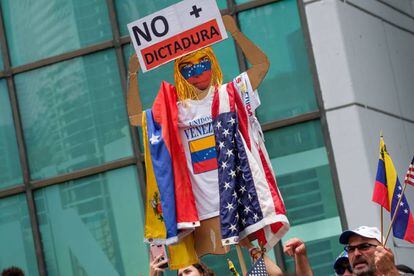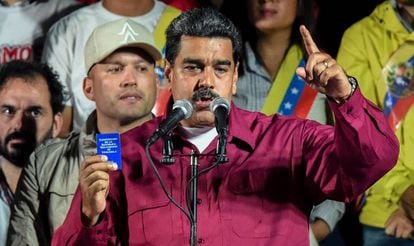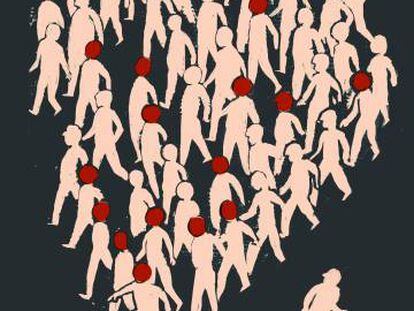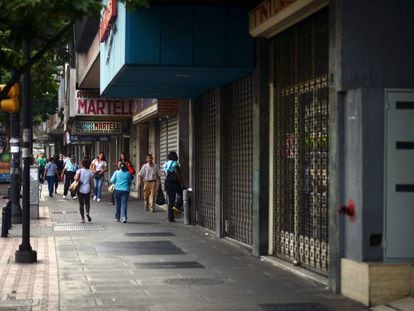Venezuelan election fiasco deepens President Maduro’s isolation
Sunday’s polls have been widely criticized with several countries refusing to recognize the results


The abysmal turnout at Venezuela’s presidential election on Sunday, with absenteeism at its highest rate in the country’s history (46%), has further weakened the government of President Nicolás Maduro. The main opposition force, the Democratic Unity Roundtable (MUD), called for a boycott of the vote for lacking proper guarantees, leaving Maduro to take an overwhelming victory – one that was only recognized as legitimate by the government. Maduro’s rivals Henri Falcón and Javier Bertucci demanded a repeat election, although the former later conceded defeat.
Today Maduro is weaker than ever before Opposition leader Julio Borges
The results mean that Maduro will continue as president of Venezuela until 2025. According to officials, Maduro won with 6.2 million votes, outperforming his closest rival Falcón, who received 1.9 million votes. It was a victory in a campaign marked by indifference and an election day during which more than half the electorate (a total of nine million) decided not to vote, believing the opposition’s argument that the polls, announced at the beginning of the year, would be fixed in favor of the authorities.
Maduro tried to encourage voting by telling the people: “Your vote decides, [will it be] votes or bullets, peace or violence?” But even the government-controlled National Electoral Council (CNE) agreed that it was the worst turnout in an election of its kind.
Despite this, Maduro, the successor of former president Hugo Chavéz, appeared before thousands of supporters to celebrate the “permanent victory of the people.” Yesterday, his Minister of Communication and Information Jorge Rodríguez, and the president of the controversial National Constituent Assembly, Delcy Rodríguez, were working hard to prove that the voter turnout was not that bad, comparing Venezuela’s figures to neighboring countries such as Colombia and the United States.
But the most revealing comparison lies in Venezuela’s own history: at the 2013 election following the death of Chávez, turnout was 80%, in 2012 it was 80.5%, and in 2006, 74.7%. In the last decade, no election had been so widely rejected.

International isolation
The government’s greatest concern is the threat of international sanctions as the United States, various Latin American and European countries, as well as the G20 economic group, have publicly condemned the vote. US Vice President Mike Pence called the election a “sham” and said the United States would not recognize the results. “Neither free nor fair. The illegitimate result of this fake process is a further blow to the proud democratic tradition of Venezuela,” Pence said in a press release.
The European Union had announced a month prior to the vote that it would not recognize the results unless it met certain conditions, such as the participation of all political forces, the plurality of the electoral council and a greater number of international observers.
Maduro will continue as president of Venezuela until 2025
And the 14 Latin American countries that make up the Lima Group have recalled their ambassadors and announced that they will limit diplomatic relations with the Maduro government. In a statement, the Lima Group said that it “does not recognize the legitimacy of the electoral process in the Bolivarian Republic of Venezuela for not meeting international standards for a free, fair and transparent democratic process."
The Spanish government warned that it will look with other European countries at what “opportune measures” could be taken against Venezuela. “It is evident that the process that took place yesterday did not meet the essential requirements … In addition to the fundamental democratic shortcomings, there were serious irregularities reported by the opposition candidates and diverse sectors of civil society about yesterday’s voting day,” the government said in a press statement.
Henri Falcón, who broke with the Chavista government in 2010 and was the leading opposition candidate, has called for new elections. But Venezuela’s opposition forces are divided. The MUD, led by Leopoldo López from the Popular Will party, Julio Borges and Henrique Capriles (Justice First) and Henry Ramos Allup (Democratic Action), had refuse to participate, in an effort to highlight the growing isolation of the Maduro government.
“We implore Venezuelans not to be demoralized. Today Maduro is weaker than ever before. We are in the final phase of a tragic cycle in our country. He has been exposed and the world will repudiate the fraud today,” said Borges on Sunday’s election day.
It remains to be seen what the opposition will do next and whether they will stay true to their commitment to maintain their pressure against the Maduro government.
“Maduro’s regime is progressively more isolated”
The former mayor of Caracas, Antonio Ledezma, one of the main Venezuelan dissidents in Spain, argues that the widespread international condemnation over the election results has placed Maduro in the "abyss of illegitimacy." Pointing to the Lima Group's statement, Ledezma outlined that "this is not just diplomatic rhetoric but rather the announcement of financial sanctions, which indicates the shunning of a regime that is becoming progressively more isolated because of its unconstitutional actions."
Ledezma, who escaped house arrest in Venezuela and fled to Spain last November, asked the Spanish government to maintain the sanctions imposed by the European Union and United States. The former mayor, who did not take part in last Sunday's election, wished for the "opposition to find again its coherency and agree to the maxim that to speak of free elections in Venezuela, we need to end the dictatorship."
English version by Melissa Kitson.












































